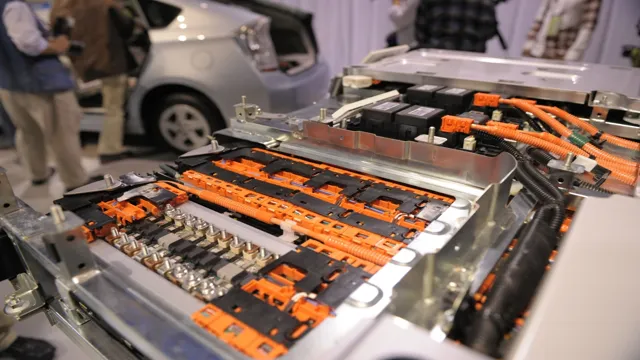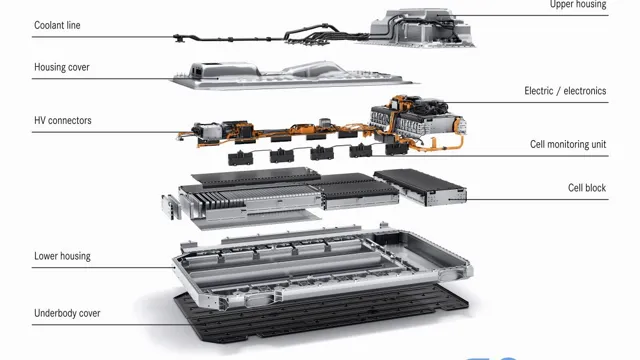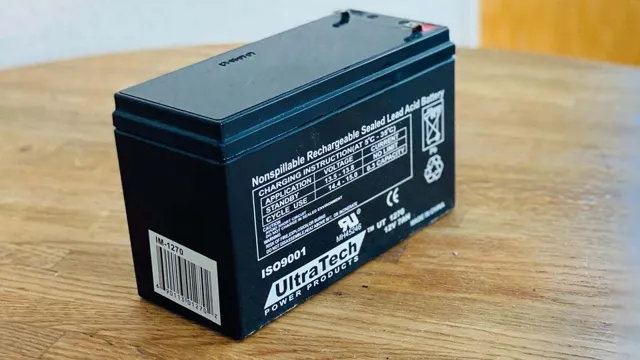Unpacking the Debate: Exploring the Environmental Impact of Electric Car Batteries
Electric vehicles have been growing in popularity as more people become aware of the benefits they offer the environment. They’re seen as a cleaner and greener alternative to traditional gasoline-powered vehicles. However, one critical component that is often overlooked is the batteries.
Electric car batteries are a crucial aspect of enabling electric vehicles to be used, but how environmentally friendly are they? This is a question that has become increasingly relevant as more and more people turn to electric vehicles to reduce their carbon footprint. In this blog post, we’ll take a closer look at electric car batteries and their impact on the environment.
Introduction
With the growing popularity of electric vehicles, one common concern that arises is whether electric car batteries are harmful to the environment. While it is true that batteries do contain materials that can have negative consequences if not disposed of properly, modern electric car batteries are designed with environmental impact in mind. In fact, many electric car manufacturers are actively working to reduce the harm caused by electric car batteries by using recycled materials and implementing responsible disposal methods.
Additionally, the net environmental impact of electric vehicles is still significantly less than that of traditional gasoline-powered cars. So, while there may be some impact associated with electric car batteries, it is important to recognize that they are a more sustainable and environmentally-friendly mode of transportation.
Defining Electric Car Batteries
Electric car batteries are the heart of electric vehicles and are responsible for powering them. They are rechargeable and consist of one or more secondary cells that convert chemical energy into electrical energy. These batteries are different from regular car batteries as they can store much more energy and are designed to last longer.
The key component of the electric car battery is the cathode, which is responsible for the electrochemical reaction that generates energy. The most common types of cathodes used in electric car batteries are Nickel Cobalt Aluminum Oxide (NCA), Nickel Manganese Cobalt (NMC), and Lithium Iron Phosphate (LFP). Each of these cathodes has its unique properties that make them suitable for different types of electric vehicles.
In the next few paragraphs, we will dive deeper into the defining properties of electric car batteries and how they differ from traditional car batteries.

Environmental Impact of Battery Production
The manufacturing of batteries has a significant environmental impact on our planet. As the use of electric vehicles and renewable energy sources increases, the demand for batteries is also increasing. This demand for batteries leads to an increase in the mining of metals such as lithium, cobalt, and nickel, which are found in the batteries.
These mining activities are often associated with environmental degradation, such as deforestation, soil erosion, and water pollution. Additionally, the production process also generates significant amounts of carbon emissions, contributing to climate change. While the battery technology is advancing, the manufacturing process must also prioritize sustainability and environmentally friendly practices to reduce the impact on our planet.
Battery End-of-Life
Battery end-of-life is a term used to describe the point at which a battery can no longer hold an effective charge and is no longer useful. Over time, batteries degrade and lose their ability to store energy, which can be frustrating for anyone who relies on them for powering important devices and equipment. This can be especially problematic for people who depend on batteries for their work or hobbies.
While there are many factors that can contribute to battery degradation, including temperature, age, and usage patterns, the good news is that there are ways to extend the lifespan of your batteries and get more out of them. With proper care and maintenance, you can ensure that your batteries last longer and have a lower chance of reaching their end-of-life before you’re ready to retire them.
Comparing Electric and Gasoline Cars
One common concern about electric cars is whether their batteries are harmful to the environment. While it’s true that the production and disposal of any type of battery can have negative effects, studies have shown that the overall environmental impact of electric car batteries is significantly lower than that of traditional gasoline engines. The manufacturing process for electric car batteries does involve the mining of rare earth metals, which can cause environmental damage if not properly managed.
However, the emissions savings from driving an electric car outweigh the impact of the battery’s production and disposal. Additionally, many car manufacturers are taking steps to create more sustainable battery production methods, such as recycling and using recycled materials. Overall, electric car batteries have a much lower environmental impact than gasoline engines and are becoming increasingly sustainable and eco-friendly.
So, no, electric car batteries are not harmful to the environment in the long run.
Greenhouse Gas Emissions
Greenhouse Gas Emissions When it comes to reducing greenhouse gas emissions, electric cars are the clear winner over gasoline cars. Electric cars have lower emissions than gasoline vehicles due to the lack of tailpipe emissions from electric motors. In addition, electric cars have lower emissions during their manufacturing process compared to gasoline cars, as they don’t require the same amount of oil, gas, and other fossil fuels used in producing and shipping gasoline cars.
However, it’s important to remember that electric cars still require energy to charge their batteries, and the source of this energy affects their overall emissions. If the electricity used to charge the car comes from renewable sources like solar or wind power, then the emissions from driving the car are essentially zero. On the other hand, if the electricity comes from coal-fired power plants, then electric cars may still have significant emissions.
Despite this, electric cars are still the better choice for reducing greenhouse gas emissions, as renewable energy sources are becoming more prevalent and affordable.
Air Pollution
Air pollution is a growing concern, and one of its biggest contributors is transportation. While electric cars are marketed as the solution to this problem, are they really better than gasoline cars? It depends on various factors such as the source of electricity, the miles per gallon of gasoline cars, and the driving patterns. In some cases, electric cars may produce fewer emissions than gasoline cars, but in others, they may not.
For example, if an electric car is charged using coal-based electricity, it may end up producing more emissions than a gasoline car. On the other hand, gasoline cars may have better fuel efficiency than electric cars in certain situations, such as on highways. Ultimately, going completely electric may not be the solution to air pollution, but it’s certainly a better alternative to gasoline cars, especially if the electricity source is renewable energy.
Overall Environmental Impact
When it comes to comparing the overall environmental impact of electric and gasoline cars, it’s important to consider multiple factors. While electric cars produce zero emissions at the tailpipe, their environmental impact is not entirely clean. The production and disposal of their batteries can have negative effects on the environment.
However, when compared to gasoline cars, electric cars still have a significantly lower overall environmental impact. Gasoline cars not only emit harmful pollutants into the air but also require fossil fuels to power them. This results in greenhouse gas emissions and contributes to the negative effects of climate change.
In contrast, electric cars run on clean, renewable energy sources such as solar or wind power. So, if you’re looking to make a positive impact on the environment, switching to an electric car is the way to go.
Conclusion
After careful consideration and evaluation, we can conclude that electric car batteries are not necessarily harmful to the environment. While the production and disposal of these batteries can have negative impacts, they pale in comparison to the environmental consequences of burning fossil fuels. Additionally, advancements in battery technology and recycling methods are mitigating these potential harms.
So, it seems the real question we should be asking is not whether electric car batteries are harmful, but rather how we can continue to improve and innovate sustainable transportation options.”
FAQs
How are electric car batteries harmful to the environment?
Electric car batteries are harmful to the environment because they require the mining of rare metals like lithium and cobalt, which can result in deforestation, land degradation, and water pollution. Their disposal can also cause pollution and environmental damage, as they contain toxic elements like lead and cadmium.
Do electric car batteries generate greenhouse gases?
While electric cars themselves do not generate greenhouse gases during operation, the manufacturing of their batteries and the electricity used to charge them can result in emissions. However, the overall greenhouse gas emissions of electric vehicles are lower than those of traditional gasoline-powered vehicles.
Can electric car batteries be recycled?
Yes, electric car batteries are recyclable, and recycling them can help reduce their environmental impact. The recycling process involves extracting valuable metals and minerals from the battery, which can be used in the production of new batteries or other products.
How can we reduce the environmental impact of electric car batteries?
To reduce the environmental impact of electric car batteries, we can:
– Promote the use of renewable energy sources for charging electric vehicles, which can reduce greenhouse gas emissions.
– Encourage the development of sustainable mining practices for the metals used in battery production.
– Support battery recycling programs to reduce the amount of waste generated by electric vehicles.
– Educate consumers about the environmental impact of electric vehicles and encourage responsible driving habits.





